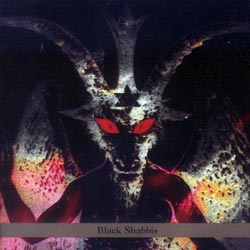
Jamie Saft's Black Shabbis is somewhat of an oddity — an hour of crushing heavy metal made by a jazz virtuoso. Saft is no stranger to dark and chaotic music (he is on John Zorn's label after all), but is a man known primarily for his jazz trio. Fortunately for Saft, he's no slouch in the crushing riff department.
Part of Tzadik's Radical Jewish Culture Series, Shabbis draws from the history of anti-Semitism to create a blend of Sabbath-worshiping stoner riffs and early black metal. As detailed in the album's packaging, the bleak and violent concept behind the music is the history of Jewish people; timely, considering the growing musical appreciation for bands within the metal community (such as Arghoslent and their critical darling Hornets of the Pogrom) who release music with intolerant messages and are praised for it. Counter-hate speech using dark and violent music to reflect the artist's personal feelings, what could possibly be more metal?
But all the socio-political aspirations in the world are worthless without good music to convey the message, and here Saft mostly succeeds.
The record itself is kind of a grab bag. Saft produced, engineered, and played every instrument on the album — quite the achievement, but his talent is spread unevenly. The sound is deeply rooted in Tony Iommi's big and hazy riff style, which is too often forgotten in contemporary metal's obsession with technicality. The sound booms and reverberates like a series of depth-charges, sometimes resonating as if it were recorded in a cathedral. The songs are normally mid-to-slow paced, with brief bursts of blazing speed, such as "Blood" and its Slayer-esque trem bar abuse.
There is also a strong impression of Norwegian metal in the extensive low-end distortion and echo, hearkening back to the atmosphere of early Bathory. The bass and 70's-style keyboards are clearly audible and well used, which in some ways improves upon the average black metal formula. Saft's jazz proficiency is rarely on display, but would have kept the songs more interesting: they tend to drag on with only a handful of riffs.
Yes, Saft commits the most atrocious stoner-rock sin, and fails to keep the long songs engaging; "Der Judenstein (The Jewery Stone)" and "Kielce" are the worst perpetrators here, confusing rambling noise for atmosphere, thus devaluing the great riffs on display. Also, despite the earnestness of Saft's love of metal (there is no irony or hipness on Black Shabbis, thank God), his voice is not well suited to deep gutturals, so he makes up for it with irritating vocal distortion.
When the formula works, the results are as good as anything Sleep put out during that band's heyday. "Army Girl" stands out with its awesome bluesy riffs, and sleazy-yet-endearing grooves, simultaneously sensual and apocalyptic. The most effective track overall is "Remember," thanks to haunting guest vocals from Jamie's wife Vanessa — the song is like a heavy metal whisper, reminding listeners to never repeat history's mistakes between head bangs. Misfires aside, this is a great slab of blackened stoner metal, with something unique: a humanist message for its intended audience.
Comments and Feedback:



More Recent Reviews, Articles, and Interviews @ The Squid's Ear...


|

